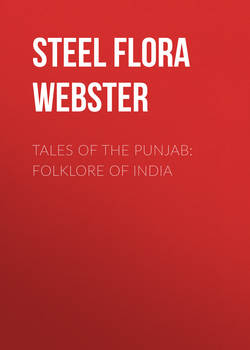Читать книгу Tales of the Punjab: Folklore of India - Steel Flora Annie Webster - Страница 2
TO THE LITTLE READER
ОглавлениеWould you like to know how these stories are told? Come with me, and you shall see. There! take my hand and do not be afraid, for Prince Hassan's carpet is beneath your feet. So now!—'Hey presto!
Abracadabra!' Here we are in a Punjabi village.
* * * * *
It is sunset. Over the limitless plain, vast and unbroken as the heaven above, the hot cloudless sky cools slowly into shadow. The men leave their labour amid the fields, which, like an oasis in the desert, surround the mud-built village, and, plough on shoulder, drive their bullocks homewards. The women set aside their spinning-wheels, and prepare the simple evening meal. The little girls troop, basket on head, from the outskirts of the village, where all day long they have been at work, kneading, drying, and stacking the fuel-cakes so necessary in that woodless country. The boys, half hidden in clouds of dust, drive the herds of gaunt cattle and ponderous buffaloes to the thorn-hedged yards. The day is over, the day which has been so hard and toilful even for the children,—and with the night comes rest and play. The village, so deserted before, is alive with voices; the elders cluster round the courtyard doors, the little ones whoop through the narrow alleys. But as the short-lived Indian twilight dies into darkness, the voices one by one are hushed, and as the stars come out the children disappear. But not to sleep: it is too hot, for the sun which has beaten so fiercely all day on the mud walls, and floors, and roofs, has left a legacy of warmth behind it, and not till midnight will the cool breeze spring up, bringing with it refreshment and repose. How then are the long dark hours to be passed? In all the village not a lamp or candle is to be found; the only light—and that too used but sparingly and of necessity—being the dim smoky flame of an oil-fed wick. Yet, in spite of this, the hours, though dark, are not dreary, for this, in an Indian village, is story-telling time; not only from choice, but from obedience to the well-known precept which forbids such idle amusement between sunrise and sunset. Ask little Kaniyâ, yonder, why it is that he, the best story-teller in the village, never opens his lips till after sunset, and he will grin from ear to ear, and with a flash of dark eyes and white teeth, answer that travellers lose their way when idle boys and girls tell tales by daylight. And Naraini, the herd-girl, will hang her head and cover her dusky face with her rag of a veil, if you put the question to her; or little Râm Jas shake his bald shaven poll in denial; but not one of the dark-skinned, bare-limbed village children will yield to your request for a story.
No, no!—from sunrise to sunset, when even the little ones must labour, not a word; but from sunset to sunrise, when no man can work, the tongues chatter glibly enough, for that is story-telling time. Then, after the scanty meal is over, the bairns drag their wooden-legged, string-woven bedsteads into the open, and settle themselves down like young birds in a nest, three or four to a bed, while others coil up on mats upon the ground, and some, stealing in for an hour from distant alleys, beg a place here or there.
The stars twinkle overhead, the mosquito sings through the hot air, the village dogs bark at imaginary foes, and from one crowded nest after another rises a childish voice telling some tale, old yet ever new,—tales that were told in the sunrise of the world, and will be told in its sunset. The little audience listens, dozes, dreams, and still the wily Jackal meets his match, or Bopolûchî brave and bold returns rich and victorious from the robber's den. Hark!—that is Kaniyâ's voice, and there is an expectant stir amongst the drowsy listeners as he begins the old old formula—
'Once upon a time—'
